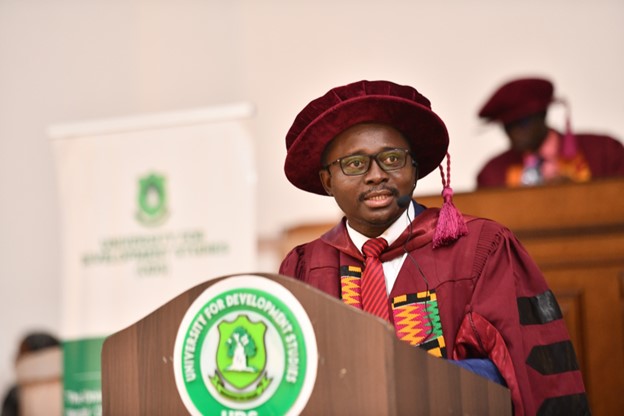The University for Development Studies (UDS) has held its 15th inaugural lecture with a call for more investments into aquaculture development.
Prof. Eliot Haruna Alhassan – with the Department of Fisheries and Aquatic Resources Management, Faculty of Biosciences – who made the call, noted that the fisheries sector contributes to socioeconomic growth; alleviating poverty and improving the livelihoods of marginalised communities across the world.
The event, dubbed ‘Life below water; development and trajectory of Ghana’s inland fisheries’, formed part of the auspicious occasion for the university to acknowledge the promotion of a full professor and was aimed at demonstrating the contribution of sustainable inland fisheries to livelihood enhancement in the socio-economic development of our country is enormous – and therefore needs more investment to make the sector an attractive one for the youth.
The event was chaired by Vice Chancellor Prof. Seidu Al- Hassan and Pro-Vice Chancellor Prof. Felix Kofi Abagale with support from the university staff, and provided an opportunity for Prof. Eliot to present on the topic.
Over the past two decades, the fisheries sector’s growth was steady at an average of three percent per annum, falling short of its expected potential. Foreign exchange earnings from fisheries increased from US$165.7million in 2010 to US$309.7million in 2015, with a corresponding increase in overall fish production by volume of 9.3 percent between 2010 and 2015 according to the MoFAD 2016 report, he said.
According to Prof. Eliot, the big threat to life below water is overfishing and unsustainable aquaculture; with the majority of fisheries comprising over 80 percent of assessed stocks fully fished or overfished today – adding that Illegal, Unreported and Unregulated (IUU) fishing accounts for as much as 53 percent of reported catch.
In 2017, the total fishery production of Ghana was 448,192.87 tonnes: of which 314,033.9 tones from marine capture fisheries; 76,753.66 tonnes from inland capture fisheries; and 57,405.31 tonnes from inland aquaculture production – with 70 percent of the production from marine, 17 percent from freshwater and 13 percent from aquaculture, he added.
He noted that aquatic ecosystems like coastal waters, fresh and brackishwaters as well as marine ecosystems serve as source of food, protein and medicine for man.
Most of our inland waters, especially rivers, have been subjected to habitat degradation and aquatic pollution through illegal small-scale mining – popularly known in Ghana as ‘galamsey’, with consequent adverse impacts on water quality, aquatic life and even humans, he said.
In order to have healthy communities, we need clean air, natural resources and a non-toxic environment. Sustainable development therefore provides an approach to making better decisions on the issues which affect all of our lives, he said.
The relevant stakeholders should control illegal small-scale mining in our rivers, to help prevent pollution and siltation of the water-bodies and destruction of fish habitats, he said.
He stressed the need to educate students on how to manage these resources sustainably for the benefit of future generations.
He said transboundary water resources such as the Volta basin should be protected by all countries sharing the resource, in order to avoid negative impacts on countries downstream.
Trees should be cut down properly in potential inundation areas during the construction of dams for hydropower generation and irrigation purposes, to prevent the loss of lives through accidentally hitting tree-stumps during navigation and transport on the future reservoir, he added.
Prof. Alhassan’s research interests include freshwater ecology, water quality assessment, fish stock assessment, management of small-scale inland fisheries, wetland ecology and conservation, impact of climate change and climate variability on inland fisheries, fish-farming and contribution of small-scale inland fisheries to food security.
He has collaborated with several researchers in Ghana, sub-Saharan Africa, Germany and China.
He has over 150 scientific publications to his credit including 72 articles in peer-reviewed scholarly journals, 6 book chapters, 70 referenced conference proceedings and 8 technical reports.










